Emily Cook's Blog, page 34
June 30, 2013
Love more, pig-out less. (Weak and Lovely returns)
This week, Weak and Lovely returns.
The series is coming back because I need it to.
Summer has gotten in my way. Summer, a wonderful time to rest and play, to let the kids stay up later, to relax the rules—I love summer. But for me, it started out with a stress fracture in my foot. Hobbling mama switched to survival mode. She could have spent the extra time in forced rest learning about nutrition and planning real food recipes while focusing on strength-training instead of cardio.
She could have.But instead, she relaxed, and she sulked. And she relaxed the rules, too, with a little rebellion in her attitude.
So I’m sitting here now, in this body. My foot is better, but the rest of me has gotten pretty lazy. My self-control and my heart have become lazy as well—so lazy, in fact, that I’m tired of it. I’m tired of letting my flesh win all the battles. I’m hungry for cheese for health. I’m hungry for freedom from my stomach. I’m hungry for God to help me love more and pig-out less.
 This week, my goals are as follows:
This week, my goals are as follows:
Cut out a trigger food. It’s so easy for me to pretend that healthy living is just too complicated, like I have no idea where to start. But for me, it is SO obvious. Sugar is a major trigger for me. I need to stop wringing my hands and just cut it out.
Refocus on what matters (Why I am caring for my body, and more importantly, the one thing needful.) For me, this is just getting back to basics- meal planning and devotions.
Post daily on this topic (and a little of the usual stuff, too.) This will help me stay accountable (I hope!)
For you were called to freedom, brothers. Only do not use your freedom as an opportunity for the flesh, but through love serve one another. For the whole law is fulfilled in one word: “You shall love your neighbor as yourself.”Galatians 5:13-14
God help us love fully and live freely in Jesus!
Will you join me?Perhaps it’s time for you to cut out a trigger food?
Or will you commit to thinking on these things with me throughout this week?

For more in this series click here
The series is coming back because I need it to.
Summer has gotten in my way. Summer, a wonderful time to rest and play, to let the kids stay up later, to relax the rules—I love summer. But for me, it started out with a stress fracture in my foot. Hobbling mama switched to survival mode. She could have spent the extra time in forced rest learning about nutrition and planning real food recipes while focusing on strength-training instead of cardio.
She could have.But instead, she relaxed, and she sulked. And she relaxed the rules, too, with a little rebellion in her attitude.
So I’m sitting here now, in this body. My foot is better, but the rest of me has gotten pretty lazy. My self-control and my heart have become lazy as well—so lazy, in fact, that I’m tired of it. I’m tired of letting my flesh win all the battles. I’m hungry for cheese for health. I’m hungry for freedom from my stomach. I’m hungry for God to help me love more and pig-out less.
 This week, my goals are as follows:
This week, my goals are as follows:
Cut out a trigger food. It’s so easy for me to pretend that healthy living is just too complicated, like I have no idea where to start. But for me, it is SO obvious. Sugar is a major trigger for me. I need to stop wringing my hands and just cut it out.
Refocus on what matters (Why I am caring for my body, and more importantly, the one thing needful.) For me, this is just getting back to basics- meal planning and devotions.
Post daily on this topic (and a little of the usual stuff, too.) This will help me stay accountable (I hope!)
For you were called to freedom, brothers. Only do not use your freedom as an opportunity for the flesh, but through love serve one another. For the whole law is fulfilled in one word: “You shall love your neighbor as yourself.”Galatians 5:13-14
God help us love fully and live freely in Jesus!
Will you join me?Perhaps it’s time for you to cut out a trigger food?
Or will you commit to thinking on these things with me throughout this week?

For more in this series click here
Published on June 30, 2013 13:04
June 28, 2013
Boys in High Places
They celebrate the joy of making it to a resting place during a long hike!
Suddenly the legs that could barely hold little bodiesupright on the trails can run stairs and explore the shelter house.
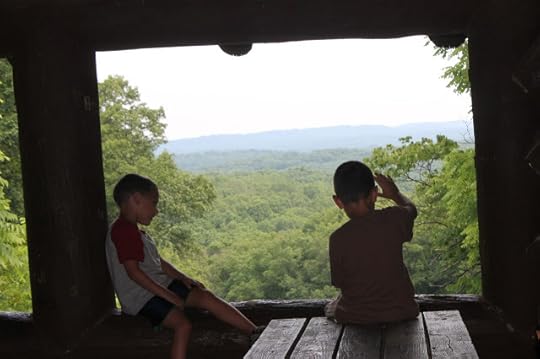
Suddenly the boy has forgotten the sweat, the bugs, the complaints.He sees the view and feels the breeze.
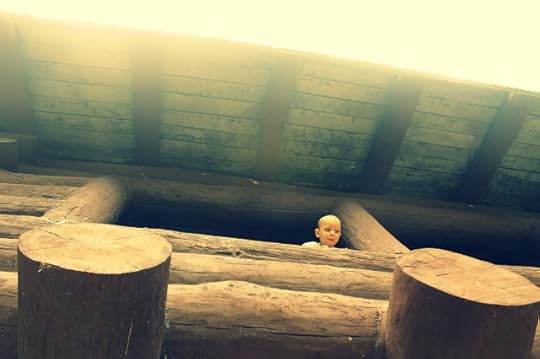
A little boy with parched lips, begging for water only moments before, suddenly finds new strength in his body,new moisture in his mouth.
He smiles, puckers, gathers, and of course, spits.
And I wonder...Did God ,who created both little boys and high places, have this fun in mind all along?
Suddenly the legs that could barely hold little bodiesupright on the trails can run stairs and explore the shelter house.

Suddenly the boy has forgotten the sweat, the bugs, the complaints.He sees the view and feels the breeze.

A little boy with parched lips, begging for water only moments before, suddenly finds new strength in his body,new moisture in his mouth.
He smiles, puckers, gathers, and of course, spits.
And I wonder...Did God ,who created both little boys and high places, have this fun in mind all along?
Published on June 28, 2013 02:00
June 27, 2013
O Come Let us Sing
Come, let us sing for joy to the Lord;let us shout aloud to the Rock of our salvation.

let us come before him with thanksgiving,and extol him with music and song.

For the Lord is a great God,the great King above all gods.In his hand are the depths of the earth,and the mountain peaks belong to him.

The sea is his, for he made it,and his hands formed the dry land.
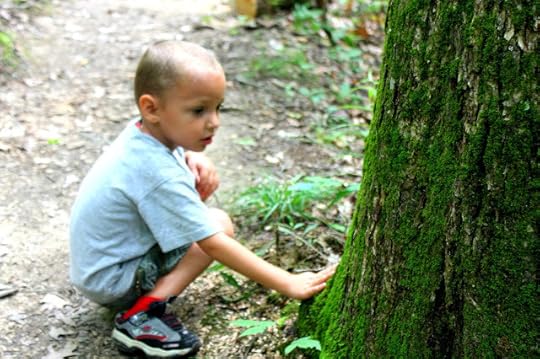
Come let us bow down in worship,let us kneel before the Lord our Maker;for he is our Godand we are the people of his pasture,and the sheep of his hand.

(Psalm 95:1-6)

let us come before him with thanksgiving,and extol him with music and song.

For the Lord is a great God,the great King above all gods.In his hand are the depths of the earth,and the mountain peaks belong to him.

The sea is his, for he made it,and his hands formed the dry land.

Come let us bow down in worship,let us kneel before the Lord our Maker;for he is our Godand we are the people of his pasture,and the sheep of his hand.

(Psalm 95:1-6)
Published on June 27, 2013 02:30
June 24, 2013
Be there for them with a vengeance
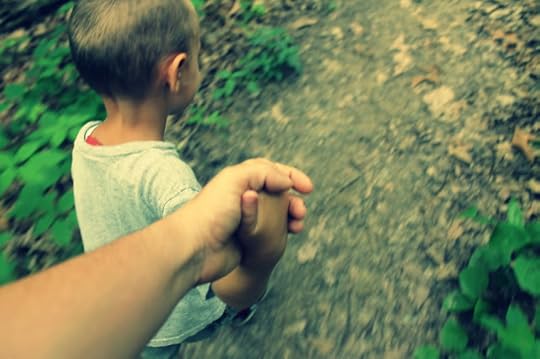
"Your body is the first thing any child of man ever wanted. Therefore dispose yourself to be loved, to be wanted, to be available. Be there for them with a vengeance. Be a gracious, bending woman. Incline your ear, your heart, your hands to them.... To be a Mother is to be the sacrament - the effective symbol - of place. Mothers do not make homes, they are our home."
from Bed and Board, Robert Farrar Caponas cited on Mothers Are Home
(I highly recommend this blog!)
Published on June 24, 2013 02:30
June 21, 2013
Small Steps
"Come on, my pokey little puppy," I say. "Mama I NOT a puppy!" he complains. Step after determined step, he hikes along. How many two-year-olds can hike for three miles? This one can.

Daddy and the older children are far ahead. He stops to inspect a leaf, a flower, a patch of moss. I feel the familiar tension... do we conquer the path and catch up with the others? Or do we take small steps, savor, and wonder?
When do I not feel this tension?
We cross a dry creek bed and the bank is steep so I offer my hand. "No mama, I do it," he insists, and I lean back with a smirk to watch his attempt. I have band-aids in my pocket.
He steps and slips, but he keeps his head down, determined. He made it up. "See, mama? I big." He walks ahead of me, and I linger, marveling. My baby-- he is big.
I begin to sing, and his echo comes, small and sweet. I want to stop singing so I can listen to his voice alone in the woods, but he still needs me to guide him.
We sing.
This is the day that the Lord has made. We will rejoice and be glad in it.

I use his slowness as an excuse to be slow, to savor. I lap up drops of beauty and store them in my camera. They will not taste the same when I see them on a computer screen, but they will help me remember these moments on the trail. We see a red flower, but we do not know its name. We see dandelions and daisies and I think of my grandmother, and the hikes we took, and the way she taught me to name the flowers. “Daisy,” I say, my small boys repeat, “Daisy.”

I point to the tree tops that cover us, and I ask questions that have no answer. “Does God have to think about every single one of these leaves to make them all? Can you imagine how many leaves He has made today?” It all seems so extravagant, the scene God has constructed for our lives today. We see more flowers, and I take another picture. “Why did God put this little pink rose way out here in the woods? Why does God put some of his best artwork where people rarely go?”

We see another daisy, and another one. The boys are happy to use the name they just learned, over and over. Daisies grow like weeds, and I wonder who decides what flowers are loved and which are called weeds. I marvel at the decorations God has placed on our path. He does not save his art for special occasions. How many beautiful flowers did will live and die quietly, never seen by a single human eye? Small boys have no answers, so I do not ask the question. I pick a daisy, and my son smiles. “We see this one, don’t we? I’m sure God won’t mind if I pick it for you.”

His cheeks are red and sweaty, but his smile shows deep, happy dimples. I hoist him on my shoulders, and he does not let go of the daisy.

Daddy and the older children are far ahead. He stops to inspect a leaf, a flower, a patch of moss. I feel the familiar tension... do we conquer the path and catch up with the others? Or do we take small steps, savor, and wonder?
When do I not feel this tension?
We cross a dry creek bed and the bank is steep so I offer my hand. "No mama, I do it," he insists, and I lean back with a smirk to watch his attempt. I have band-aids in my pocket.
He steps and slips, but he keeps his head down, determined. He made it up. "See, mama? I big." He walks ahead of me, and I linger, marveling. My baby-- he is big.
I begin to sing, and his echo comes, small and sweet. I want to stop singing so I can listen to his voice alone in the woods, but he still needs me to guide him.
We sing.
This is the day that the Lord has made. We will rejoice and be glad in it.

I use his slowness as an excuse to be slow, to savor. I lap up drops of beauty and store them in my camera. They will not taste the same when I see them on a computer screen, but they will help me remember these moments on the trail. We see a red flower, but we do not know its name. We see dandelions and daisies and I think of my grandmother, and the hikes we took, and the way she taught me to name the flowers. “Daisy,” I say, my small boys repeat, “Daisy.”

I point to the tree tops that cover us, and I ask questions that have no answer. “Does God have to think about every single one of these leaves to make them all? Can you imagine how many leaves He has made today?” It all seems so extravagant, the scene God has constructed for our lives today. We see more flowers, and I take another picture. “Why did God put this little pink rose way out here in the woods? Why does God put some of his best artwork where people rarely go?”

We see another daisy, and another one. The boys are happy to use the name they just learned, over and over. Daisies grow like weeds, and I wonder who decides what flowers are loved and which are called weeds. I marvel at the decorations God has placed on our path. He does not save his art for special occasions. How many beautiful flowers did will live and die quietly, never seen by a single human eye? Small boys have no answers, so I do not ask the question. I pick a daisy, and my son smiles. “We see this one, don’t we? I’m sure God won’t mind if I pick it for you.”

His cheeks are red and sweaty, but his smile shows deep, happy dimples. I hoist him on my shoulders, and he does not let go of the daisy.
Published on June 21, 2013 02:00
June 19, 2013
Law & Gospel in the Home
A warm welcome to today's guest blogger: Haleigh Morgan!
I encourage all who are facing the difficult task of teaching children "right from wrong" well also showering them with the grace of God to read the article below.
-- Emily
I was recently asked by an online friend to chime in on the question of Law and Gospel within the context of the home. That is, how might we parents approach the task of parenting, knowing when we are to give our children Law and when we are to give them Gospel?
Let me state upfront that I consider myself supremely unqualified to instruct others on just about anything, most especially on the monumental calling of being a parent. I can only speak from my own experience and what I know to be true from scripture and from our Confessions. As a sister in Christ, I can offer mutual conversation and consolation of the gospel. Beyond that, the reader may be cautioned to have loads of salt ready to go (with which to take anything written below.) ;)
In the question of law and gospel and how to parent in these terms are suggested a few additional ideas. First, we constantly run the risk of erring too much on the side of one or the other. If we are too focused on law, we become despotic legalists or “pietists,” thinking that if our Milly or Norbert could be taught to behave just so and say and do all the right things, then all will be right. The other side of this coin is antinomianism. When we err on the side of little or even no law, we run the risk of raising hedonistic, selfish tyrants whom not even we like being around. No loving parent knowingly and deliberately takes either of these two paths. Thus our conundrum. How do we, parents who are presumably very concerned that we fulfill our duties to God, to our children, to society, go about knowing which is called for in any given situation? If we choose wrongly at some time, will we forever muck things up, potentially scarring our child for life? These are questions that lurk in the back of our minds, keep us up at night, and make us second guess ourselves. Before we go any further, let me say, “Peace. God chose to entrust these children to you for a reason. He has equipped you to raise them, though you will most certainly not do so perfectly. Your own Father, who never fails, is working to love your children through you. He is their Father, too.”
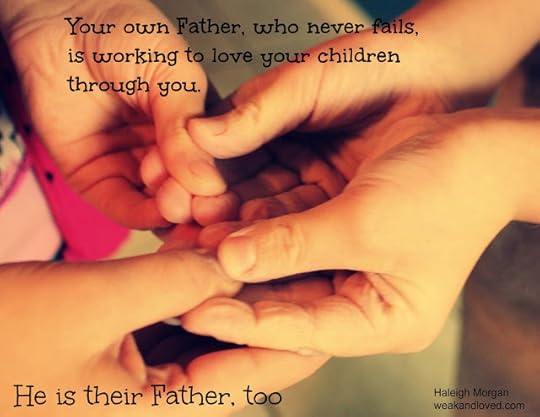
Ok. Now back to our regularly scheduled program.
I would like to begin any discussion of parenting within the context of Christian vocation. We are told in the Small Catechism that we are to examine ourselves in light of the Ten Commandments and of other scripture that outlines the duties attendant to the various estates established by God. These are comprehended in the 2nd table. These commandments establish how God would have us to fear and love Him in how we interact with our neighbors. (Luther’s explanation of each commandment after the 1stbegins, “We are to fear and love God that we may…”) We are also told that love is the fulfillment of the Law. Thus, these commandments also outline how we love our neighbors and how God loves them through us.
The fourth commandment, in particular, relates to all rightful worldly authority, beginning with parents and radiating out from there to the civil realm and the Church. In the Large Catechism, we are taught that God holds all authority. He entrusts portions of that authority to the various estates so that people called to administer them may carry out their duties legitimately. The Church has the Office of the Keys – authority to bind or loose sins. Magistrates have authority to make civil laws and compel citizens to obey. But, “all (earthly) authority flows and is born from the authority of parents” (LC, 4). Civil fathers, “masters” (employers), and even spiritual fathers derive their authority and honor from the office given to parents.
What does all this talk of the 4th commandment, which speaks most directly to children of their duty toward their parents, have to do with a parent’s duty to his/her children? No vocation exists in a vacuum. Each is a diad. Governments are not governments without the governed. Citizens are not citizens in the absence of a country. A husband is not a husband without a wife; nor is a wife a wife without a husband. A pastor has hearers, and hearers have a pastor. So it is with children. All children, by nature, are born of a father and mother. There is no child ever anywhere (except Jesus) who didn’t have both an earthly mother and father. And, every mother and every father is a parent by virtue of the fact that they have received a child. So, when the 4th commandment addresses children and their duties, it also suggests something to parents. The command to honor our father and our mother enjoins all people to respect those placed over us in authority even as it enjoins those exercising authority to do so for the benefit and betterment of those placed underneath them.
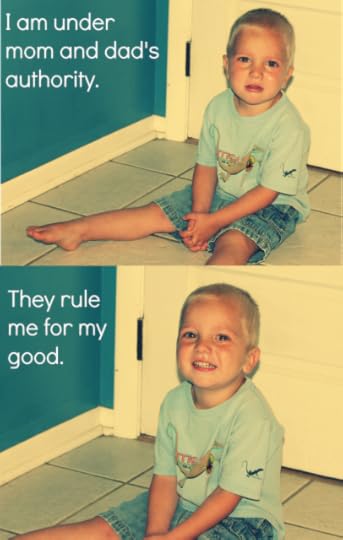
So, what are the duties that a parent owes to her children? When is it time to lay down the law and when is it time to give them grace? Parents are first and foremost commanded to bring children up in the fear and admonition of the Lord. That is, we are aware that any authority we have as parents is not really ours but is God’s authority, and our very first responsibility as parents is to bring them to God. It is not only our rules in our home that we must train them to obey. “He does not assign this honor to [us], that is power and authority to govern, so [we] can have [ourselves] worshipped.” We are to provide physically for our children, but most importantly we are to “train them to honor and praise God.” This is not something that we may do or might do but must do. It is “not left to [our] pleasure and arbitrary will” but is “God’s strict command and order, to whom [we] must give account for it” (LC, 4). We also know that none of us can even begin to keep this 1st command (to have no other God, to fear, love, and trust in Him above all things) without first being regenerated and reborn of God. How does such rebirth happen for us, for our children, or for anyone? We are saved by grace through faith. How does faith come? Faith comes by hearing and hearing through the Word of Christ. Where and how do we receive this Word of Christ? We receive it through the proclaimed Word and through the Word combined with water and bread and wine. We must make sure that our children receive this, too. If we do nothing else as parents, this we must do. Bring them to the font. Bring them to the Word.
Give them Jesus.
 Give them Jesus!
Give them Jesus!
We must also train them to honor and respect us as God’s representatives to them. Since children are commanded to “honor their father and mother” we are simply not at liberty to allow them to do otherwise. God has not given us the authority to set aside this commandment any more than He has given us the authority to set aside the 1st, 5th or 6thor any of the others. Our will and word are entirely subordinate to God’s. “For if God’s Word and will are in force and being accomplished, nothing shall be valued higher than the will and word of parents, as long as that, too, is subordinated to obedience toward God and is not opposed to the preceding commandments” (LC, 4). So far the hierarchy is established as: 1.) God, 2.) Parents.
Third, we must train them also to function in civil society.That is, we must equip them to be useful, to be able to provide for their own children someday, and to have the skills and manners that contribute to a peaceful and orderly community. To accomplish this duty, we typically have to establish rules and routines for the household – expectations for work/chores, etiquette, lessons, study, practice, etc. – and both model and enforce these expectations. The family is a microcosm of the world. Children learn how to be a part of the greater community by first learning how to live in the community of the family.
So far this sounds very law heavy. Parents must DO. Children must DO. But, where is the grace? I am asking this question as loudly as you surely are. Here, I try to remember that every vocation is at its heart a picture of how God relates to us. Yet, it is more than just an illustration. It is real and material. God works among us through the estates (the vocations) He has established.
God’s work in the world is not simply an intangible, subjective, spiritual thing. It is very material. Remember, God is a God of means. He uses material means to accomplish His work among us so that we have objective assurance and can receive His work substantially, really, and truly – both physically and spiritually – because we are not purely spiritual creatures. We are material creatures with a rational soul. So, He works among us in a material way. God is hidden in vocation just as surely as He is hidden in the Means of Grace. This is not to say that parenthood, marriage, and citizenship are Sacraments in the strict sense. But we may safely say that they are “sacramental” and mysterious. Paul tells us that marriage is a mystery and that in speaking of marriage he is really speaking of Christ and the Church. Christ is hidden in marriage (Eph. 5). God the Father is hidden in the vocation of parenting. He provides for His children and brings them to Himself through parents. Parents bring children to the font and the rail and the assembly; they feed, and clothe them, and they train them up in the way that they should go. The earthly father doesn’t just symbolize something about God. But, in actuality, God is the real father. Christ is the real husband. The Church is the real wife and mother. Our earthly vocations are dim images of the real thing going on with God (paraphrased from Gene Veith, Interview on Issues Etc.4/16/12 #1and #2).
God doesn’t only provide 1st article gifts through us parents. He also has enabled us to participate in the giving of forgiveness and absolution (2nd and 3rd article gifts) – grace at its sweetest. It goes without saying that we participate in this not as primary actors. Faith, forgiveness of sins, these do not originate from us nor take their efficacy from us. But, God can and does use parents as agents of grace.

How does this grace look in the family? First, we must try to remember that if our child is already heartbroken and repentant over something, it does him no additional good to be given law. We don’t need to stand over him and remind him of the rule he has broken or the disappointment he has caused. He is already contrite. The Law has done its work. However, if he is being head-strong and recalcitrant, then law is what he gets – first God’s, then ours.
 Is this the face of contrition?
Is this the face of contrition?
Second, we must try to distinguish between matters of immaturity and matters of genuine disobedience. Sometimes this can be pretty tricky. How do we know whether our child is willfully disobeying a command he could obey or if he is simply not understanding or is not yet mature enough to obey in that particular command? If we are certain that the child knows what is expected and has demonstrated that he can obey what he has been given to do, then willfully failing to do so is a matter of obedience. If he does not understand, does not have the skill or maturity to obey, then it would be cruel to respond with more law. Mercy is called for.
Third, we also try to be very honest with ourselves about whether we have done our job of teaching and leading prior to resorting to punishment. Discipline sometimes requires punishment, but punishment is not always discipline. If punishment does not teach, it is not discipline. It is just revenge. It is easy to forget that something that may be terribly obvious to us and a matter of common sense may not be to a new, little person. Children are our disciples in that we lead and teach them what they need to know as they grow up. We must first give them the gift of loving instruction and nurture. This is discipline. If the child obstinately refuses the instruction, then it may be time to use punishment to redirect their heart and their actions back to the better course.
But, most importantly, we practice absolution. Parents and children alike must know that even when we royally muck things up, confession and contrition always receive forgiveness, no matter what. And the matter is done. Even if we know for a fact that tomorrow we will likely go through the whole thing again. We know that we can speak the comfort of the gospel to our brothers and sisters in Christ. This is the mutual consolation that Luther talks about. Our children are our smallest brothers and sisters in Christ. They need to receive our forgiveness freely, and they need us to remind them of the forgiveness that is theirs in Christ.
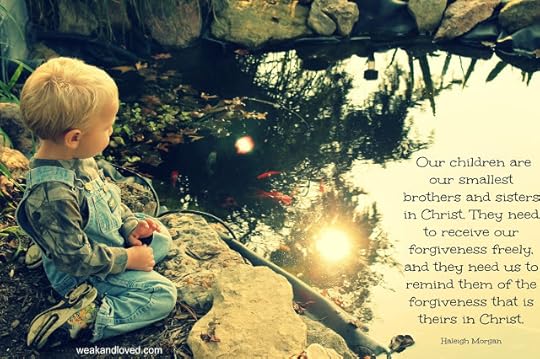
Ultimately, when in doubt, we must try to remember Paul’s instruction. “We who are strong have an obligation to bear with the failings of the weak, and not to please ourselves. Let each of us please his neighbor for his good, to build him up. For Christ did not please himself, but as it is written, ‘The reproaches of those who reproached you fell on me.’” (Romans 15:1-3, ESV) Diligently teach; graciously give. Bear with our children’s weakness and build them up. Let all that you do be done in love. (1 Cor. 16:14)
For further reading, if you are interested, Rolf Preus has written a fabulous post featured on Steadfast Lutherans titled “Steadfast Dads — Discipline”.
Father, use our hands to bless your children, our children. Amen.
.
I encourage all who are facing the difficult task of teaching children "right from wrong" well also showering them with the grace of God to read the article below.
-- Emily
I was recently asked by an online friend to chime in on the question of Law and Gospel within the context of the home. That is, how might we parents approach the task of parenting, knowing when we are to give our children Law and when we are to give them Gospel?
Let me state upfront that I consider myself supremely unqualified to instruct others on just about anything, most especially on the monumental calling of being a parent. I can only speak from my own experience and what I know to be true from scripture and from our Confessions. As a sister in Christ, I can offer mutual conversation and consolation of the gospel. Beyond that, the reader may be cautioned to have loads of salt ready to go (with which to take anything written below.) ;)
In the question of law and gospel and how to parent in these terms are suggested a few additional ideas. First, we constantly run the risk of erring too much on the side of one or the other. If we are too focused on law, we become despotic legalists or “pietists,” thinking that if our Milly or Norbert could be taught to behave just so and say and do all the right things, then all will be right. The other side of this coin is antinomianism. When we err on the side of little or even no law, we run the risk of raising hedonistic, selfish tyrants whom not even we like being around. No loving parent knowingly and deliberately takes either of these two paths. Thus our conundrum. How do we, parents who are presumably very concerned that we fulfill our duties to God, to our children, to society, go about knowing which is called for in any given situation? If we choose wrongly at some time, will we forever muck things up, potentially scarring our child for life? These are questions that lurk in the back of our minds, keep us up at night, and make us second guess ourselves. Before we go any further, let me say, “Peace. God chose to entrust these children to you for a reason. He has equipped you to raise them, though you will most certainly not do so perfectly. Your own Father, who never fails, is working to love your children through you. He is their Father, too.”

Ok. Now back to our regularly scheduled program.
I would like to begin any discussion of parenting within the context of Christian vocation. We are told in the Small Catechism that we are to examine ourselves in light of the Ten Commandments and of other scripture that outlines the duties attendant to the various estates established by God. These are comprehended in the 2nd table. These commandments establish how God would have us to fear and love Him in how we interact with our neighbors. (Luther’s explanation of each commandment after the 1stbegins, “We are to fear and love God that we may…”) We are also told that love is the fulfillment of the Law. Thus, these commandments also outline how we love our neighbors and how God loves them through us.
The fourth commandment, in particular, relates to all rightful worldly authority, beginning with parents and radiating out from there to the civil realm and the Church. In the Large Catechism, we are taught that God holds all authority. He entrusts portions of that authority to the various estates so that people called to administer them may carry out their duties legitimately. The Church has the Office of the Keys – authority to bind or loose sins. Magistrates have authority to make civil laws and compel citizens to obey. But, “all (earthly) authority flows and is born from the authority of parents” (LC, 4). Civil fathers, “masters” (employers), and even spiritual fathers derive their authority and honor from the office given to parents.
What does all this talk of the 4th commandment, which speaks most directly to children of their duty toward their parents, have to do with a parent’s duty to his/her children? No vocation exists in a vacuum. Each is a diad. Governments are not governments without the governed. Citizens are not citizens in the absence of a country. A husband is not a husband without a wife; nor is a wife a wife without a husband. A pastor has hearers, and hearers have a pastor. So it is with children. All children, by nature, are born of a father and mother. There is no child ever anywhere (except Jesus) who didn’t have both an earthly mother and father. And, every mother and every father is a parent by virtue of the fact that they have received a child. So, when the 4th commandment addresses children and their duties, it also suggests something to parents. The command to honor our father and our mother enjoins all people to respect those placed over us in authority even as it enjoins those exercising authority to do so for the benefit and betterment of those placed underneath them.

So, what are the duties that a parent owes to her children? When is it time to lay down the law and when is it time to give them grace? Parents are first and foremost commanded to bring children up in the fear and admonition of the Lord. That is, we are aware that any authority we have as parents is not really ours but is God’s authority, and our very first responsibility as parents is to bring them to God. It is not only our rules in our home that we must train them to obey. “He does not assign this honor to [us], that is power and authority to govern, so [we] can have [ourselves] worshipped.” We are to provide physically for our children, but most importantly we are to “train them to honor and praise God.” This is not something that we may do or might do but must do. It is “not left to [our] pleasure and arbitrary will” but is “God’s strict command and order, to whom [we] must give account for it” (LC, 4). We also know that none of us can even begin to keep this 1st command (to have no other God, to fear, love, and trust in Him above all things) without first being regenerated and reborn of God. How does such rebirth happen for us, for our children, or for anyone? We are saved by grace through faith. How does faith come? Faith comes by hearing and hearing through the Word of Christ. Where and how do we receive this Word of Christ? We receive it through the proclaimed Word and through the Word combined with water and bread and wine. We must make sure that our children receive this, too. If we do nothing else as parents, this we must do. Bring them to the font. Bring them to the Word.
Give them Jesus.
 Give them Jesus!
Give them Jesus!We must also train them to honor and respect us as God’s representatives to them. Since children are commanded to “honor their father and mother” we are simply not at liberty to allow them to do otherwise. God has not given us the authority to set aside this commandment any more than He has given us the authority to set aside the 1st, 5th or 6thor any of the others. Our will and word are entirely subordinate to God’s. “For if God’s Word and will are in force and being accomplished, nothing shall be valued higher than the will and word of parents, as long as that, too, is subordinated to obedience toward God and is not opposed to the preceding commandments” (LC, 4). So far the hierarchy is established as: 1.) God, 2.) Parents.
Third, we must train them also to function in civil society.That is, we must equip them to be useful, to be able to provide for their own children someday, and to have the skills and manners that contribute to a peaceful and orderly community. To accomplish this duty, we typically have to establish rules and routines for the household – expectations for work/chores, etiquette, lessons, study, practice, etc. – and both model and enforce these expectations. The family is a microcosm of the world. Children learn how to be a part of the greater community by first learning how to live in the community of the family.
So far this sounds very law heavy. Parents must DO. Children must DO. But, where is the grace? I am asking this question as loudly as you surely are. Here, I try to remember that every vocation is at its heart a picture of how God relates to us. Yet, it is more than just an illustration. It is real and material. God works among us through the estates (the vocations) He has established.
God’s work in the world is not simply an intangible, subjective, spiritual thing. It is very material. Remember, God is a God of means. He uses material means to accomplish His work among us so that we have objective assurance and can receive His work substantially, really, and truly – both physically and spiritually – because we are not purely spiritual creatures. We are material creatures with a rational soul. So, He works among us in a material way. God is hidden in vocation just as surely as He is hidden in the Means of Grace. This is not to say that parenthood, marriage, and citizenship are Sacraments in the strict sense. But we may safely say that they are “sacramental” and mysterious. Paul tells us that marriage is a mystery and that in speaking of marriage he is really speaking of Christ and the Church. Christ is hidden in marriage (Eph. 5). God the Father is hidden in the vocation of parenting. He provides for His children and brings them to Himself through parents. Parents bring children to the font and the rail and the assembly; they feed, and clothe them, and they train them up in the way that they should go. The earthly father doesn’t just symbolize something about God. But, in actuality, God is the real father. Christ is the real husband. The Church is the real wife and mother. Our earthly vocations are dim images of the real thing going on with God (paraphrased from Gene Veith, Interview on Issues Etc.4/16/12 #1and #2).
God doesn’t only provide 1st article gifts through us parents. He also has enabled us to participate in the giving of forgiveness and absolution (2nd and 3rd article gifts) – grace at its sweetest. It goes without saying that we participate in this not as primary actors. Faith, forgiveness of sins, these do not originate from us nor take their efficacy from us. But, God can and does use parents as agents of grace.

How does this grace look in the family? First, we must try to remember that if our child is already heartbroken and repentant over something, it does him no additional good to be given law. We don’t need to stand over him and remind him of the rule he has broken or the disappointment he has caused. He is already contrite. The Law has done its work. However, if he is being head-strong and recalcitrant, then law is what he gets – first God’s, then ours.
 Is this the face of contrition?
Is this the face of contrition?Second, we must try to distinguish between matters of immaturity and matters of genuine disobedience. Sometimes this can be pretty tricky. How do we know whether our child is willfully disobeying a command he could obey or if he is simply not understanding or is not yet mature enough to obey in that particular command? If we are certain that the child knows what is expected and has demonstrated that he can obey what he has been given to do, then willfully failing to do so is a matter of obedience. If he does not understand, does not have the skill or maturity to obey, then it would be cruel to respond with more law. Mercy is called for.
Third, we also try to be very honest with ourselves about whether we have done our job of teaching and leading prior to resorting to punishment. Discipline sometimes requires punishment, but punishment is not always discipline. If punishment does not teach, it is not discipline. It is just revenge. It is easy to forget that something that may be terribly obvious to us and a matter of common sense may not be to a new, little person. Children are our disciples in that we lead and teach them what they need to know as they grow up. We must first give them the gift of loving instruction and nurture. This is discipline. If the child obstinately refuses the instruction, then it may be time to use punishment to redirect their heart and their actions back to the better course.
But, most importantly, we practice absolution. Parents and children alike must know that even when we royally muck things up, confession and contrition always receive forgiveness, no matter what. And the matter is done. Even if we know for a fact that tomorrow we will likely go through the whole thing again. We know that we can speak the comfort of the gospel to our brothers and sisters in Christ. This is the mutual consolation that Luther talks about. Our children are our smallest brothers and sisters in Christ. They need to receive our forgiveness freely, and they need us to remind them of the forgiveness that is theirs in Christ.

Ultimately, when in doubt, we must try to remember Paul’s instruction. “We who are strong have an obligation to bear with the failings of the weak, and not to please ourselves. Let each of us please his neighbor for his good, to build him up. For Christ did not please himself, but as it is written, ‘The reproaches of those who reproached you fell on me.’” (Romans 15:1-3, ESV) Diligently teach; graciously give. Bear with our children’s weakness and build them up. Let all that you do be done in love. (1 Cor. 16:14)
For further reading, if you are interested, Rolf Preus has written a fabulous post featured on Steadfast Lutherans titled “Steadfast Dads — Discipline”.
Father, use our hands to bless your children, our children. Amen.
.
Published on June 19, 2013 03:00
June 17, 2013
Whirling on a motocycle
I ride on the back of my husband’s motorcycle, and this thing I do is not motherly.
We fly away, just the two of us. I hold his waist and smile at the breeze. The dirt under my nails joins us for the ride, and the sweat, from my garden-work. But my love has come from his office, where work was hard and cold on a computer screen. He does not mind my earthiness.
The corn is coming up. Everything is green. God is kind to give us this season of miracles, when dead seeds burst to life and we learn to hope again.
The heat and the itch from the garden work are blown away.
There is a farmer on a four-wheeler, inspecting his crops. When he looks at them, does he see business, and dollar signs? Or does he see God’s touch, does he marvel at the sprouts? Does He pray for God’s kind protection and rain like mercy? Does it terrify him, or please him, to behold millions of fragile spouts in this great expanse? How many mouths will be fed from these beautiful acres?
A steep hill, and speed. I look away from the fields and ahead, and my heart jumps. Steep up, steep down, speed and tilting, and oh, the wind! The air, the speed, the life!
I have a need to stand near the edge, to feel this small risk, to feel my heart beat. N.D. Wilson
Slowly I take my hands off of his waist. I slide them to my knees, casually, and then I let them fall back, and open. I spread my arms and arch my back in the wind.
Consider the works of His hands, the nerve-endings on arms that dance and sing on such a day as this. Consider the gift of the spring breeze, a gift not asked for, or needed, or named, until it was given and bodies received and responded with joy and gratitude. Who is this God, Creator of such a body and such a day?
I notice a car coming, so I sit up, act normal, pretend I’m not about to explode for the wonder around me.
This weekend, I am planning a garden, and a sleepover, and he plans a funeral. We plant seeds.
Onward, we fly past homes where people tend flowers and cows and children. We fly through green life under the warm sun, yet even on this day I know sudden winter can come like a car wreck, like cancer. Death comes even in spring, even on this green day. How many roadside turtles? How many loving and loved? How many mamas on motorcycles?
To my surprise, we are suddenly in town. I have no idea how this happened, and I smile on my back seat. It is good to follow the one who knows the way. It is good to be the one with her head in the cornfields and the dirt and the sun, and to arrive safely, despite herself.
We slow, and stop briefly at a corner. The skin on my upper arm is cool, and in a flash, I feel and remember my grandmother’s hug. Cool, sagging flesh made a warm embrace. Was it better to give or receive such hugs? Do I appreciate them more now, in my memory, then I did when they were given? And will my arms be given days of cool sagging and warm embracing?
My love and I, we do not fear death. How can you fear from the hands of Him who is Life? We drive on, looking death in the face, and we shall win. We win, again and again, until the day that we lose. But today, on this motorcycle, we win.
We do not fear death, and yet he slows down, way down, on the loose rock.
I am grateful.
There are children at home.
----
Inspired by Notes from The Tilt-A-Whirl.
Wonder, from my eyes, in my scene, on today’s stage.
Your comments make my day! What do you think of this writing "voice?"
We fly away, just the two of us. I hold his waist and smile at the breeze. The dirt under my nails joins us for the ride, and the sweat, from my garden-work. But my love has come from his office, where work was hard and cold on a computer screen. He does not mind my earthiness.
The corn is coming up. Everything is green. God is kind to give us this season of miracles, when dead seeds burst to life and we learn to hope again.
The heat and the itch from the garden work are blown away.
There is a farmer on a four-wheeler, inspecting his crops. When he looks at them, does he see business, and dollar signs? Or does he see God’s touch, does he marvel at the sprouts? Does He pray for God’s kind protection and rain like mercy? Does it terrify him, or please him, to behold millions of fragile spouts in this great expanse? How many mouths will be fed from these beautiful acres?
A steep hill, and speed. I look away from the fields and ahead, and my heart jumps. Steep up, steep down, speed and tilting, and oh, the wind! The air, the speed, the life!
I have a need to stand near the edge, to feel this small risk, to feel my heart beat. N.D. Wilson
Slowly I take my hands off of his waist. I slide them to my knees, casually, and then I let them fall back, and open. I spread my arms and arch my back in the wind.
Consider the works of His hands, the nerve-endings on arms that dance and sing on such a day as this. Consider the gift of the spring breeze, a gift not asked for, or needed, or named, until it was given and bodies received and responded with joy and gratitude. Who is this God, Creator of such a body and such a day?
I notice a car coming, so I sit up, act normal, pretend I’m not about to explode for the wonder around me.
This weekend, I am planning a garden, and a sleepover, and he plans a funeral. We plant seeds.

Onward, we fly past homes where people tend flowers and cows and children. We fly through green life under the warm sun, yet even on this day I know sudden winter can come like a car wreck, like cancer. Death comes even in spring, even on this green day. How many roadside turtles? How many loving and loved? How many mamas on motorcycles?
To my surprise, we are suddenly in town. I have no idea how this happened, and I smile on my back seat. It is good to follow the one who knows the way. It is good to be the one with her head in the cornfields and the dirt and the sun, and to arrive safely, despite herself.
We slow, and stop briefly at a corner. The skin on my upper arm is cool, and in a flash, I feel and remember my grandmother’s hug. Cool, sagging flesh made a warm embrace. Was it better to give or receive such hugs? Do I appreciate them more now, in my memory, then I did when they were given? And will my arms be given days of cool sagging and warm embracing?
My love and I, we do not fear death. How can you fear from the hands of Him who is Life? We drive on, looking death in the face, and we shall win. We win, again and again, until the day that we lose. But today, on this motorcycle, we win.
We do not fear death, and yet he slows down, way down, on the loose rock.
I am grateful.
There are children at home.
----
Inspired by Notes from The Tilt-A-Whirl.
Wonder, from my eyes, in my scene, on today’s stage.
Your comments make my day! What do you think of this writing "voice?"
Published on June 17, 2013 02:00
June 16, 2013
Father's Day Advice
My 7 year old son summarized his daddy's sermon last week in this way:

"Listen to your parents like the 18 year old Josh did not."
Food for thought, for fathers and sons everywhere.Happy Father's Day.

"Listen to your parents like the 18 year old Josh did not."
Food for thought, for fathers and sons everywhere.Happy Father's Day.
Published on June 16, 2013 02:30
June 15, 2013
Which is more disgusting?
First, recommended posts from this week (ish)
The Bible Summarized in Just a few Words
Read, mark, learn, and inwardly digest this one.
The internet fastI want to prioritize family and friends, and productivity and learning, over just generally consuming and being entertained. And that takes work because the Internet is so happy to entertain you. I want to find a way to use the Internet in that way, but unfortunately I'm really out of practice, so I kind of have to learn it from scratch. I don't think I got better at using the Internet by not using it.
For the Dog Days of Motherhood
"I am out of my mind and in my calling and desperate for five minutes alone and a lifetime together."
On feeling at home in your house and in your skinHospitality, and the choice: Panic or delight? Appearance or love?
What mamas need to know this summerMamas, especially those with tempers, need to read this.
When your temper scares you.
Sometimes you don't realize you have a temper until you have kids.
I will remember to eat. To treat myself will the same care I’d treat an explosive device and disarm with regular rest, exercise, food and friendship.
This full out war against my own angry, shouty spirit will be the biggest victory I am determined to win through motherhood
Second,
Which do you think is more disgusting?
(These two things were presented to me in the span of 60 seconds.)
"Hey mama, look! I found this for you!"
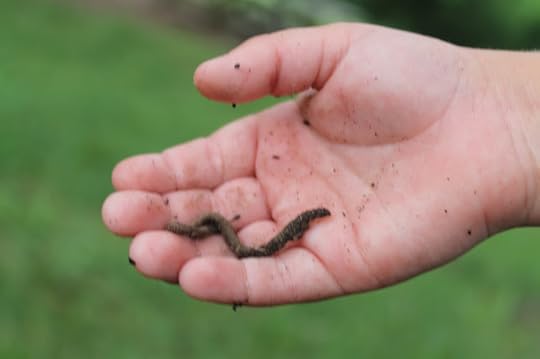
A dead earthworm.
"Hey mama, Petie was chewing on this so I took it from him."
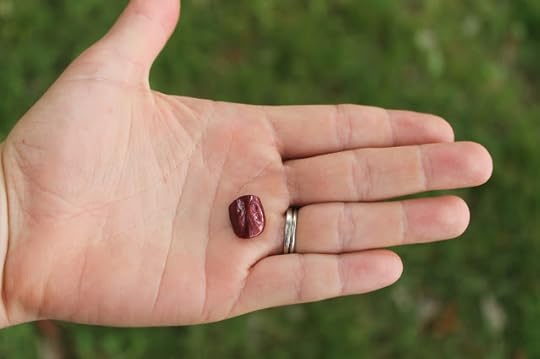
Some strangers fake fingernail.
The Bible Summarized in Just a few Words
Read, mark, learn, and inwardly digest this one.
The internet fastI want to prioritize family and friends, and productivity and learning, over just generally consuming and being entertained. And that takes work because the Internet is so happy to entertain you. I want to find a way to use the Internet in that way, but unfortunately I'm really out of practice, so I kind of have to learn it from scratch. I don't think I got better at using the Internet by not using it.
For the Dog Days of Motherhood
"I am out of my mind and in my calling and desperate for five minutes alone and a lifetime together."
On feeling at home in your house and in your skinHospitality, and the choice: Panic or delight? Appearance or love?
What mamas need to know this summerMamas, especially those with tempers, need to read this.
When your temper scares you.
Sometimes you don't realize you have a temper until you have kids.
I will remember to eat. To treat myself will the same care I’d treat an explosive device and disarm with regular rest, exercise, food and friendship.
This full out war against my own angry, shouty spirit will be the biggest victory I am determined to win through motherhood
Second,
Which do you think is more disgusting?
(These two things were presented to me in the span of 60 seconds.)
"Hey mama, look! I found this for you!"

A dead earthworm.
"Hey mama, Petie was chewing on this so I took it from him."

Some strangers fake fingernail.
Published on June 15, 2013 02:30
June 14, 2013
An odd place for a "moment"
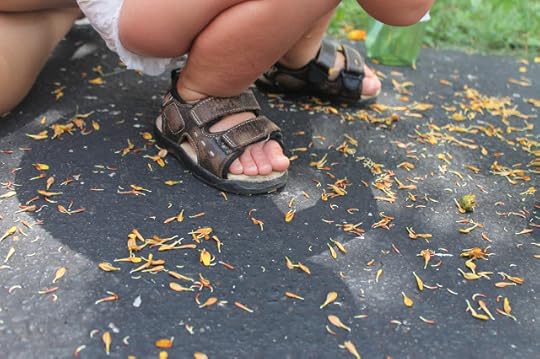
"Hey Rainy, I love you!" he says, but it sounds more like "I yub you." The cuteness is almost unbearable.She smiles and says, "I know Petie, I know. Rainy will be out in a minute."
She's in an outhouse. I'm in the stall next to her.
"Mommy, I love you so much!" says the other little boy, and I laugh and she laughs. "That's great Eldie, but can the affection wait for a minute? Mama's going potty.""Hey Rainey, I pick-ded you a flower!""Flower!" says the smaller one. They bring their finds to the door of the outhouse. The smells, the flies, do not deter the little boys, looking for their mommies.
"Petie, not NOW!" she says, but she is laughing so they do not take her seriously."Rainy we yub you!"
"Hey mama, flower! Yub you!""Yub you yots and yots!"
And so it goes while we go.
And sometimes this is not funny at all, but it was this time, because she was there: my daughter who is big enough to understand.

Published on June 14, 2013 02:30



